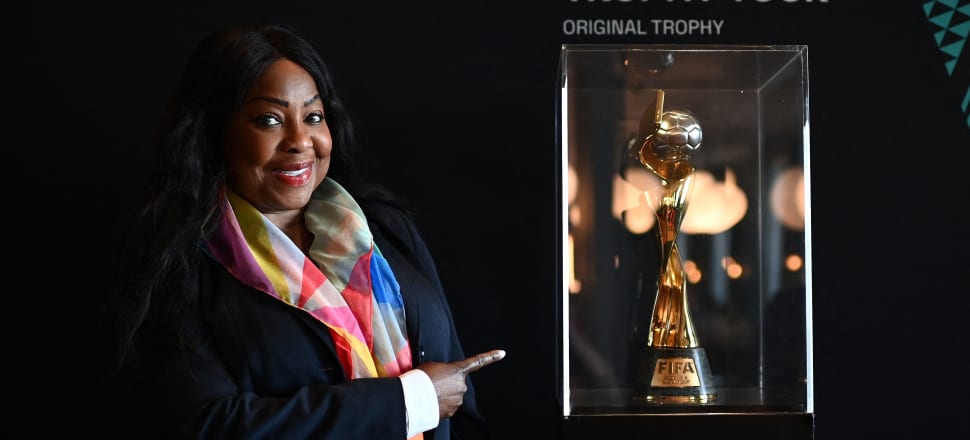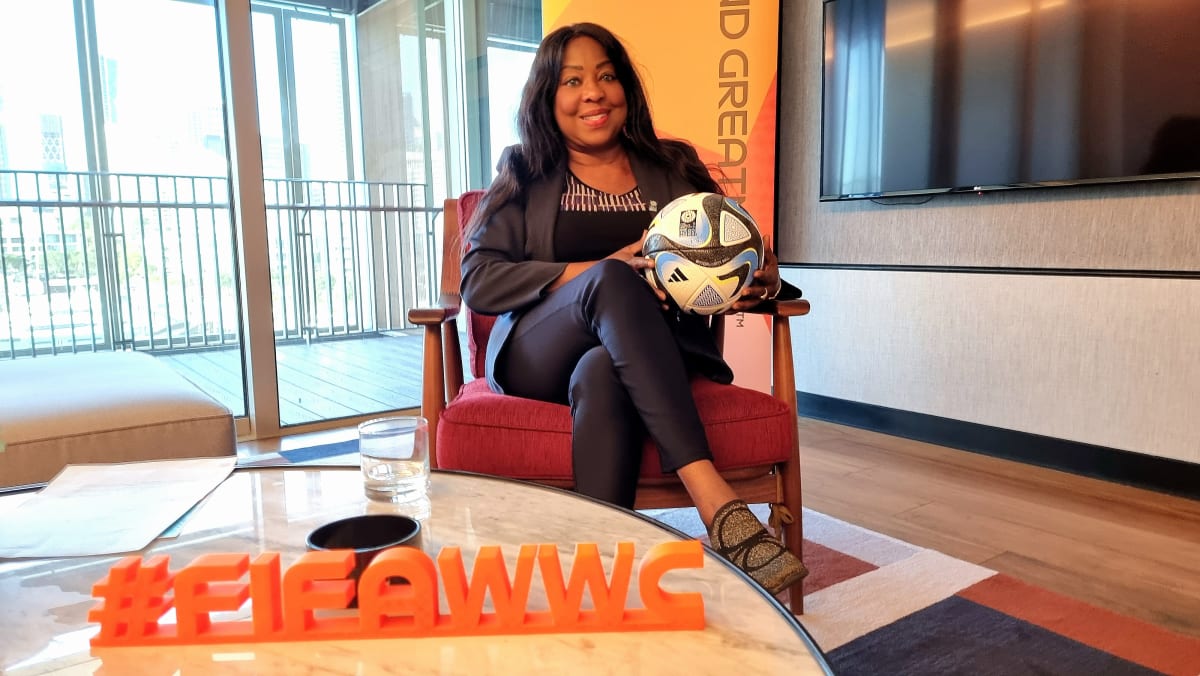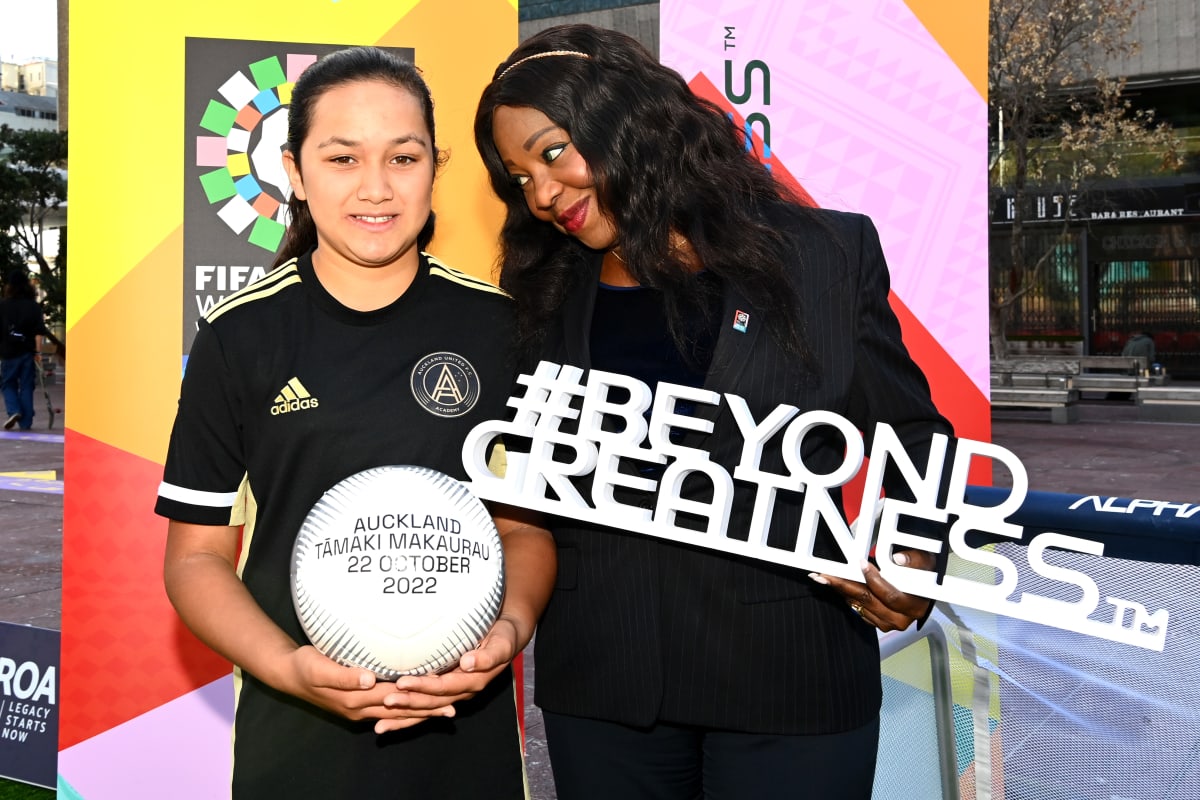
Outgoing FIFA secretary-general, Fatma Samoura, talks the difference between warlords and football “sharks”, escalating the women’s game and the art of juggling in our Wāhine of the World Cup series.
The most powerful woman to run world football, Fatma Samoura claims to have been “undefeatable” in the contest of juggling. At 60, she reckons she’s still pretty handy at keeping a football off the ground.
But few have ever witnessed those skills of FIFA’s secretary-general. The first woman, first African, first Muslim and first non-European to occupy the second-in-command role in football never got to play a game. Samoura could only practise juggling a ball in the backyard of her childhood home in Senegal.
Back then, Senegalese girls weren’t allowed to play football in public, so Samoura’s opponents were the brothers among her eight siblings. “After school we would try to juggle 100 times, and I was the only one able to do it. I’m still good at that,” she says.
But the way Madam Samoura - as media are asked to address her - has helped transform women's football will be among the accomplishments she's remembered for, once she steps down later this year after seven years in the role (she made the unexpected announcement last week while visiting the Christchurch venue for next month’s FIFA Women’s World Cup).
READ MORE: * How close to equality will FIFA Women's World Cup get? * Football Fern juggles player and coach roles
When she took up the job in 2016, and became one of the most powerful women in world sport, Samoura had no background working in football, or in any sport for that matter. Her expertise was in humanitarian work in war-torn countries for the United Nations (former Prime Minister Helen Clark was her boss).
And at that time, FIFA was in turmoil – still cleaning up after the corruption scandal that shook the sport to its core.
“I took up my position during a very difficult period, when no one wanted to be associated with FIFA; we were considered a toxic brand,” Samoura says, while in Auckland ahead of next month’s tournament.

When asked the difference between working in a war-torn country and running one of the most powerful, and controversial, sporting organisations in the world, Samoura smiles.
“Sometimes you are confronted with the same sharks,” she says. “The only difference is some of them are armed when you’re working for the UN.
“When you’re dealing with child soldiers, with warlords, it’s more scary and more frightening, and every day your life is at stake. I spent 15 months in the most dangerous part of the world, in Afghanistan, and in eastern Chad.
“Coming to football is a big change. And it showed me that football is opening up to diversity and inclusivity – I’m a woman, I’m an African, I'm black and I’m a Muslim. And to have a person like me heading football, it’s something nobody would think of a few years ago.”
During her time working alongside FIFA president Gianni Infantino, Samoura has helped restore FIFA’s credibility, changed the way the sport is run, and overseen “unprecedented growth” in the women’s game. Empowering female footballers – working with Kiwi Sarai Bareman, FIFA’s first head of women’s football - is something she’s immensely proud of.
“Football was, yes we can say, a western European, male-dominated organisation - FIFA especially. Since I joined FIFA many more women are now part of football,” she says.
“Having women’s football heading towards an era where we won’t talk about equal pay, where we won’t talk about women’s football but simply world football, is a big pride for FIFA.
“In seven years, we have moved mountains, but there’s still much to be done until we only talk about ‘football’. I’m definitely very proud to have been part of this bumpy, but also very exciting, journey.”
Samoura’s earliest football memories date back to 1970, when as an eight-year-old, she watched Brazil win the men’s version of the FIFA World Cup. “It was also the first time Pelé won for a third time,” she says. “What I took from that World Cup were the words ‘coup de grâce’ – meaning in French you terminate someone. That’s what Brazil did.”
Her family were football-mad; uncles on her mother’s side were famous Senegalese players. Her father was in the military and would take her to watch the national army team play.
Samoura studied international relations and trade in France, returned home to work for a fertiliser company before joining the UN in 1995. She worked in African nations affected by war, violence and a lack of women’s rights.

A job in football was never part of her career plan, she says, but her husband – a former player – helped change her path.
“I was always thinking I would retire as a civil servant of the United Nations, but I have a very convincing husband,” she says.
“I was very comfortable with my UN job, but when this job came up, he said: ‘No you wanted to have a more peaceful life and spend time with your daughter’ [The couple have three children].
“And he said: ‘Even if you’re not paid a penny, the moment I can get a free ticket to the World Cup, you should go for this job!’ It was the best choice I’ve made in my career, to go to FIFA at this very particular moment.”
Samoura reels off the numbers around the gender changes at the top of football.
“We have 11 women who are heading member associations, and Johanna Wood, the president of New Zealand Football, is one of them,” she says. “Now 40 percent of the staff at FIFA are women. We have many more women as members on committees – out of the 36 members of the FIFA council, six representing each of the six confederations are women.
“Diversity and gender mainstreaming is becoming part of football, and that’s just great.”
There have been more FIFA controversies during her tenure, too – among them further bribery allegations around tournament hosting rights, fury over 2022 World Cup host Qatar and human rights violations, players banned from wearing poppies and rainbow armbands, and a stand-off with European broadcasters for the Women’s World Cup TV rights (which finally ended with an agreement last week).
“There’s never a dull day in football,” she says.
“Everybody has a say in football. Everyone is a referee when there’s a football game. But this just shows the popularity of the game, and the fact we had five billion people back in December 2022 watching all 64 matches in Qatar, it’s a sign the whole world loves football.
“It also for me serves a very good purpose – using football as a platform for transformative change in society. And women’s football can also be part of this journey.”
Samoura has enjoyed working alongside Bareman. “Sarai is beautiful. She’s been the only woman sitting in the reform taskforce, and she was a very good player in that taskforce. On a few occasions she has to represent me at high level meetings and I’m also very proud to have her on my team,” she says.
“She heads women’s football, which was created for the first time when President Infantino was elected. It was a very good decision because she’s a very knowledgeable person. To have the World Cup in her part of the world is the icing on the cake. I’m sure this World Cup will be the best because she has put a lot of passion into it.”
Fatma Samoura and Sarai Bareman (second from right) are presented with Senegal women's football shirts in Dakar
Bareman accompanied Samoura to her home country in March, after the Senegal women played in the World Cup play-off tournament in New Zealand, but were knocked out by Haiti. The journey of the national team, Les Lionnes de la Teranga, has come a long way from when Samoura was a girl, and couldn't kick a ball in the streets.
“We wanted to compliment the president because the girls played very well, but also to see how we can help them,” she says. “We’ve identified them, Cameroon, Papua New Guinea and Fiji – we think they have the right ingredients to qualify for 2027 so we want to support them with additional funding, training and investment of technical staff, so they are debutants at the next World Cup.”
So what does Samoura believe co-hosting the World Cup will bring to New Zealand football?
“First I think when we kick off at Eden Park in the very first match [on July 20] it will be a festival of football. The eyes of the world will be on your country that day. So you will be on the world football map for 90 minutes,” she says.
“We also hope the momentum that’s been created bringing the World Cup to the Southern Hemisphere for the first time, and having it co-hosted by two countries, will trigger more interest. So that the communities and schools will be getting ready to build facilities that can now cater for the specific needs of women in football. Having gender neutral bathrooms and changing rooms is something people are starting to integrate as part of their football development culture.
“I’m quite confident that the legacy programme that’s been developed by New Zealand Football, called Legacy Starts Now, is something that will be progressing women’s football with the Māori communities and the Pacific communities.
“Allowing more young girls and women to be part of this beautiful game.”







